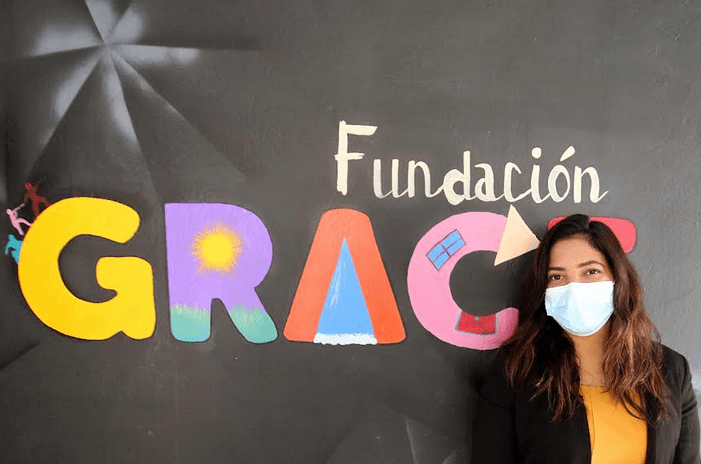Jul 24, 2021
By John Keeble
GRACE, the Cuenca foundation set up to help mostly Venezuelan and Colombian refugees, is seeing a steady flow of children and adults seeking medical and dental help as the city’s hospitals grapple with Covid disruption.
Children under 12 form the bulk of patients, and GRACE is now trying to raise enough funds to pay for a full-time pediatrician to meet the need.

Baby supplies and food packs waiting for refugees
It has a doctor, nurse, and dentist but assesses that a pediatrician is now vital – of the 250 patients in the first half of July, about 150 were children. Mental health cases are sent to an outside psychologist, part of the GRACE network of cooperation with other organizations.
Children being used by beggars on the street are particularly vulnerable because they are kept out in all weather and usually lack adequate care and nutrition.
“There are about 10,000 Venezuelan refugees in Cuenca, about the same number as North Americans,” said GRACE Director Karla Sánchez Arismendi. “Most have jobs or earn money through their own entrepreneurship, which ranges from good businesses to selling on the streets.”

Dentist María Fernanda Torres: always in demand.
Many refugees need medical, dental, and other help from GRACE as they find their feet in their new economic and social environment. That help includes food parcels, donated clothes and household goods, and other supplies specifically put together for babies and mothers. Their help center, a sparkling-clean converted house conforming to Ecuadorian health and safety laws, is not licensed for pharmaceuticals but they are building up supplies and distribution of nutritional supplements.
“Most Venezuelans are working hard to make this country better and to have good lives,” added Sánchez. “Some have good jobs, like banker, doctor, and designer, but most are entrepreneurs.” The entrepreneurs tend to have small shops, restaurants, online businesses, and street sales.
A very small but highly visible minority chooses to beg on the streets and use their children to encourage passers-by to give money.
The children, because of their living conditions, are usually small and underweight for their ages, suffering from colds from long days on the streets, and having “all kinds of issues with their teeth”.
“The kids are not studying and they are not being taught to work – they are being taught to beg,” said Sánchez. “Psychologically, it is terrible.”
The adults regard begging as an entitlement and a job, often changing into older clothes before starting their day’s work. This is very different from entrepreneurs trying to build a new life by selling on the streets.
“The best way to help, if you see an entrepreneur, is to buy something from them, help promote their businesses – they don’t want to beg,” added Sánchez. With beggars, she added, it is better to give food, blankets, and toys, but not money.

Dr. Pedro Arias offers consultations vital for refugees.
One of the important aspects of GRACE’s work is to keep track of the vulnerable community of refugees, especially children. There are about 3,500 names in the foundation’s database, which is managed by a permanent full-time volunteer, North American Luke Groeneweg.
The GRACE center, situated on Calle Mariscal Lamar near the junction with Guillermo Medina, has three main programs:
Free medical checks with the center’s full-time doctor, with treatment at a general level (but not anything requiring hospital intervention or emergency care). It has two consulting rooms, one with specific equipment for prenatal and postnatal care. It includes contraception advice and assistance. There is a qualified nurse and treatment room.
“Patients who come to us want to keep away from hospitals and the hospitals don’t want to see them because of Covid,” said Sánchez. “This means a need for general consultation here.”
Dentistry is the biggest single need of refugees and some Ecuadorians are treated by GRACE. Most problems stem from poor nutrition and oral hygiene.

Receptionist Gabriela Rivero greets refugee families.
The center’s garage is unrecognizable after being converted into a dental surgery with good equipment and a fully qualified dentist.
Checks, cleaning, and basic work like dealing with fillings are free, but GRACE cannot afford the expensive dental materials for more extensive work. It offers those services if patients can help pay for the materials.
Free clothes and household goods. These come from donations and include everything from kitchen items to bedding. Most come from ex-pats donating items, especially when they are leaving Cuenca.
GRACE partners Foundation NUR, another cause that helps refugees. That partner handles the goods and GRACE refers those in need to them.
“We can never get enough to keep up with the need,” said Sánchez.
In addition, GRACE keeps perhaps the most extensive database of people in need. Groeneweg explained: “It’s important to know who your customers are. You need to know where they are coming from and what needs they have. Data is key to that so that you, as an organization, can respond quickly and efficiently. We can then implement programs that work for the benefit of most people or a specific target audience. Data gives us the tools to make those decisions where GRACE can be effective.”
GRACE is currently working with the Red Cross in a blood drive. “Every person who donates is then entitled to five free blood products over the next 5 months if needed in an emergency,” said Sánchez. “It’s like insurance for blood if you or your family need it. Normally there is a cost for blood products of $95 per bag.”
There is always a need to raise more money to keep the foundation’s services running – and even more difficulty in raising enough to expand into vitals services like employing a paediatrician.
You can help by donating cash or goods through the foundation’s website. GRACE also collects plastic bottles to earn money to buy school necessities for refugee children.
___________________
Photos by John Keeble

